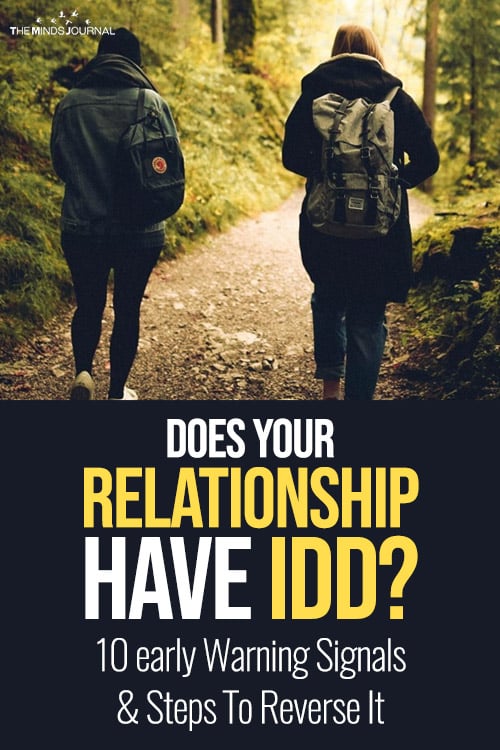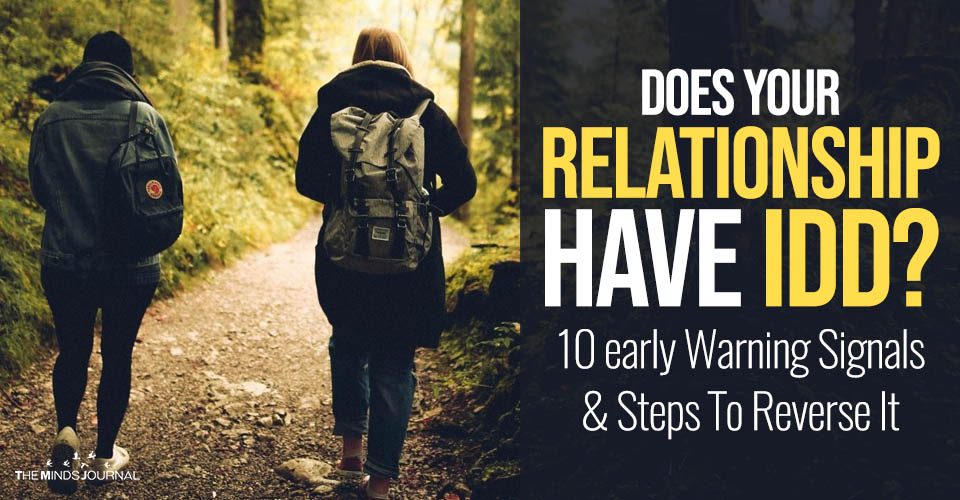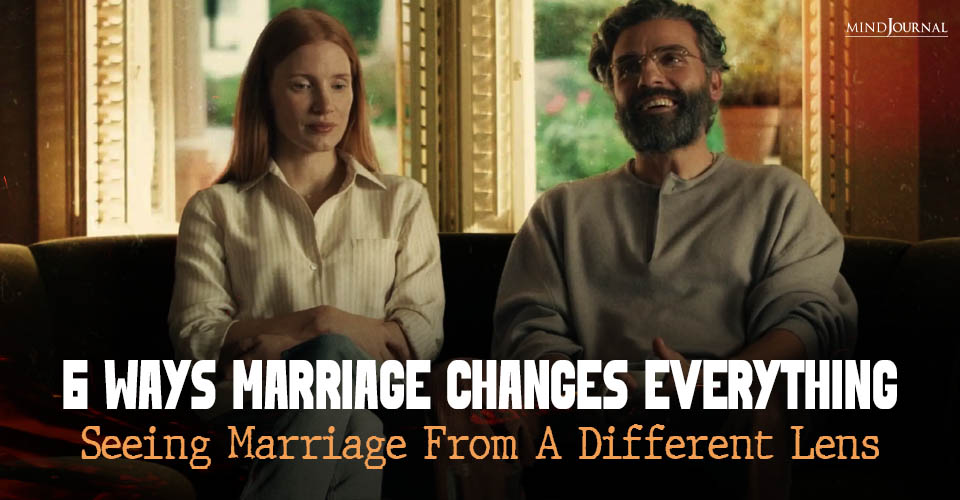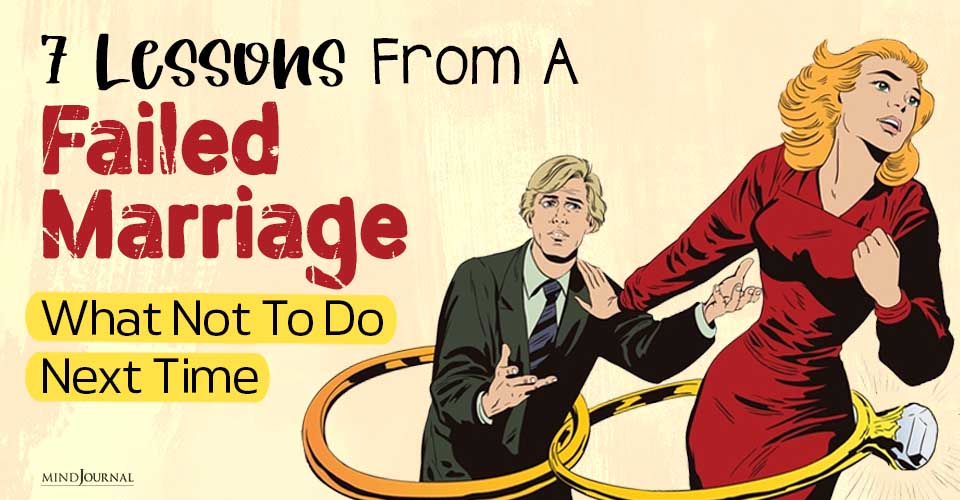No, it’s not a typo. We really did mean to write IDD rather than ADD. While IDD is a serious and potentially relationship-threatening condition, you won’t find it listed in the DSM (Diagnostic and Statistical Manual).
IDD or Intimacy Deficiency Disorder is a widespread phenomenon that affects vast numbers of couples in America and other industrialized nations.
As the name implies, IDD refers to a deficit of intimacy in a primary relationship. As many couples have learned from their own experience, such a deficit can have profound consequences that can jeopardize the foundation of even long-term partnerships, often leading to deep resentment, apathy, hopelessness, boredom, disinterest, affairs, depression, addictive or compulsive behavior, and divorce.
Sometimes referred to as the “silent killer” because of its tendency to gradually and subtly insinuate itself into relationships, IDD often first shows up as a minor irritant or disappointment that is experienced by one or both partners.
If IDD is not acknowledged and addressed promptly, there is a strong likelihood that it will begin to erode the foundation of the relationship and do severe damage to trust, affection, appreciation, and other fundamental qualities that healthy relationships require in order to thrive.
As the name implies, this condition is caused by an inadequate amount of quality connection time in the relationship. While the word “intimacy” is generally associated with sexuality, relationships that are affected by IDD aren’t necessarily lacking in sexual relations.
Intimacy isn’t simply an experience that involves sexual or even physical contact.
In many cases, we’ve found that there can be an abundance of sexual engagement but very little deep emotional connection. While some people continue to maintain the discredited belief that having sex fulfills one’s intimacy needs, this isn’t necessarily the case. Although sex can provide a pleasurable experience that temporarily distracts both partners from the absence of genuine intimacy, it cannot fulfill the need for the emotional closeness that fulfilling relationships require in order to thrive.
If one partner cannot experience true intimacy (physical or non-physical) without compulsively sexualizing the connection, over time, the spirit of goodwill and openheartedness will deteriorate in the relationship.
Marriage researcher, John Gottman, has stated that relationships that are the most at risk are not the ones in which partners tend to have frequent arguments, but rather are those in which differences have not been adequately addressed and appropriate repairs work made that restore trust and support to what he refers to as the “fondness and affection system”.
When differences are unresolved, particularly over a long period of time, there is an accumulation of “incompletions”, otherwise known as “unfinished business”. When business is unfinished, it creates a major break in the couple bond.
Although few couples have difficulty in finding reasons for their failure to spend sufficient meaningful time together, these explanations are generally the symptoms rather than the causes of any underlying deficiency in intimate connection.
While there is no doubt that most couples are faced with numerous commitments, there may be other compelling factors that influence them to hold emotional intimacy as a low priority.
There can, for example, be resistance to emotional closeness if there is a fear that this experience could activate unresolved issues that might be letter left unspoken, particularly if there is a lack of confidence in the ability to successfully address unresolved issues.
There may be a fear of activating a relationship meltdown, or resistance to the states of the vulnerability and openness that intimate connections involve, or an unwillingness to risk jeopardizing the current homeostasis or balance of the relationship.
By the time the symptoms of neglect to the relationship have outwardly shown themselves, the damage can be extensive. The notion that no news is good news does not apply here. Just because there aren’t complaints being voiced, it doesn’t mean that a relationship is healthy and thriving.
By the time symptoms of relationship erosion are apparent, substantive damage may have already occurred. If there is a timely response to the warning signs of neglect, it’s possible to avert a potentially destructive breakdown.

Here are a few of the symptoms to be on the alert for:
1. A noticeable diminishment in the frequency and or enjoyment of sexual relations.
2. Preferring to spend a greater amount of time alone or with others, rather than with your partner.
3. A diminishment or disappearance of daily rituals like goodnight kisses, affectionate touch or hugs during the day.
4. Taking your partner for granted and not acknowledging them for simple acts of kindness and generosity.
5. Finding yourself feeling excessively critical and judgmental of your partner.
6. A pervasive sense of grievance and an unwillingness to express your concerns to your partner.
7. Frequently finding reasons and justifications to excuse disrespectful words or actions on the part of your partner.
8. Feeling increasingly disinclined to give affection and care to your partner.
9. Withholding feelings that are relevant to the relationship such as disappointment, resentment, appreciation, or gratitude.
10. Frequently talking to others about relationship problems rather than expressing them directly to your partner.
The earlier you detect and respond to these indicators, the sooner you can restore a higher level of goodwill and good faith back into your relationship.
Part two of this blog will identify the steps that couples can take to repair the damage that may have been caused by IDD and describe how this crisis can ultimately be the source of motivation and intentionality to co-create a relationship that exceeds each partner’s initial hopes and expectations. Stay tuned!
Six steps to reverse IDD.
IDD (Intimacy Deficiency Disorder) is an insidious relationship-threatening condition that if unaddressed can undermine and severely damage even the most loving partnerships. In part one we identified the most prevalent symptoms of IDD that manifest themselves in relationships. In this blog, we will offer six steps that you can take to neutralize the damaging effects of IDD and restore love, trust, and goodwill to your relationship.
Step One:
Create agreement with your partner to find a good time and place (without distractions and interruptions) to have a conversation in which you can talk about some concerns that you have regarding your relationship. (Hint: It’s a good idea NOT to begin with the words: “We need to talk.”). If your partner resists or states that he or she doesn’t have the time, reassure them that this really means a lot to you, that you consider it a high priority, and that you’ll do whatever needs to be done to make it possible for both of you to find the time. Let your partner know that you want to talk about ways in which you can both take steps to enhance the quality of your connection. The emphasis here is on the “both” part. Make sure that you minimize or avoid use of the “Y” word (“you”).
Note: A few minutes obviously will not be enough time for most couples to completely come to terms with unresolved issues, but if things go well in this conversation, there will be more opportunities for future talks.
Step Two:
Express, without judgment or blame, the nature of your desire to bring greater closeness and intimacy into your relationship and acknowledge that you have played a part in the diminishment of closeness between the two of you.
Step Three:
Get honest about how you have not been clear and truthful about your concerns, desires, or grievances and acknowledge why you haven’t been more direct, if this is the case. Again, express this without blame or accusation.
Step Four:
Affirm your love for your partner and your desire to do whatever you can do to support them in joining you in this commitment.
Step Five:
Encourage your partner to express their point of view and listen respectfully without interrupting them or “clarifying” what they have said. If you don’t agree with their perspective, don’t argue, but thank them for sharing their thoughts and feelings and express a desire to find some common ground in which you can both feel understood and respected.
Step Six:
Propose that you each agree to set aside some time within the next few days to be together without any distractions for at least a couple of hours without any agenda other than to share an experience that you both enjoy, such as taking a walk, enjoying a meal together, cuddling in bed or on the sofa, taking a bike ride together, dancing, or any activity that brings pleasure to you both.
Note: this is not intended to be a time to “work on your relationship” or deal with any unresolved issues, but rather, a time to experience ease, pleasure, and enjoyment together. If any difficulties or issues arise, agree to put them aside for the time being and try to come to an agreement about a time at which you can address them.
Do NOT include anyone else in this experience.
Keep in mind that working out the differences that impair emotional intimacy requires skill, sensitivity, honesty, practice, and the courage to be vulnerable and non-defensive. By all means, do the best that you can do to work things out together, but if your efforts fail to bring about the outcome that you desire, consider getting professional help rather than giving up or continuing to interact in ways that are damaging the relationship.
Most situations, even those that are long-standing and entrenched, can be worked out if there is a willingness to do the work that is required. The earlier the intervention is in the breakdown, the less time it takes to successfully repair the damage.
When each person is willing to do their part to clean up the areas of neglect of the relationship, the results of their efforts can seem miraculous. Relationships can be transformed when the light of the truth is shined upon the darkness of neglect and both partners begin to experience the pleasure that has been absent from their relationship once again.
The benefits of healing IDD can last a lifetime and can mean the difference between living in a tolerable arrangement or a loving, thriving, and joy-filled partnership.
Think about it. And then do something!
We’re giving away 3 e-books absolutely free of charge. The Ten Biggest Things We’ve Learned Since We Got Married, Your Guide to Great Sex, and An End to Arguing. To receive them just click here.
Written by Linda and Charlie Bloom
This post is a compilation of 2 posts on Psychology Today
Does your Relationship Have IDD?
Does Your Relationship have IDD? Part 2
You may also like:
6 Sad Ways You End Up Ruining The Intimacy In Your Relationship
3 Subconscious Reasons Why We Fear Intimacy In Relationships
2 Hidden Ways We Sabotage Intimacy In The Relationship We Want
The Subconscious Tendency That Erodes Intimacy In Every Relationship











Leave a Reply